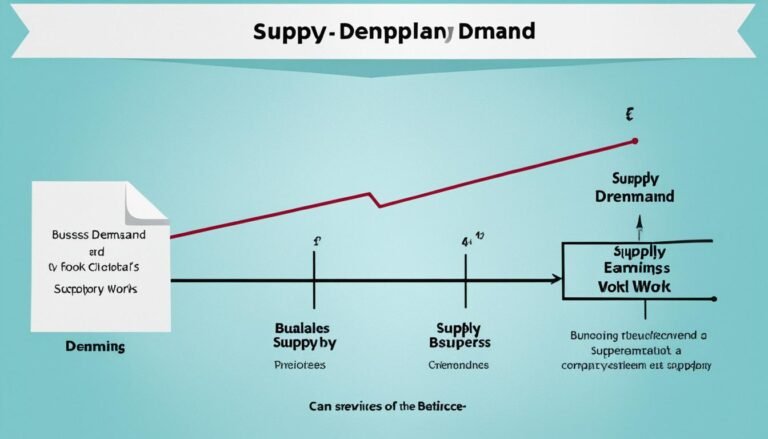How should a manager develop and implement training programs?
Did you know that investing in training programs for managers is key? It can greatly boost how long employees stay and how much they get involved at work. Research shows that when companies focus on developing their managers, they attract and keep top talent. This leads to a workplace where everyone is more productive and involved.
It’s really important to have great training programs for managers today. They not only make managers better at their jobs but also increase how happy and involved their teams are. This is key for success in a competitive business world.
Key Takeaways:
- Investing in manager training programs improves employee retention and engagement.
- Effective training programs enhance managerial skills, leading to better performance.
- Manager training programs create a positive work environment and attract top talent.
- Managers play a vital role in driving employee development and overall organizational success.
- Implementing training programs requires careful planning and evaluation for maximum impact.
The Importance of Employee Training and Development
In today’s world, companies need to see the value of training and development. This is important for an employee’s personal growth. But it also helps the company do better as a whole.
A LinkedIn study found 94% of employees would stay longer with an employer who invests in them. Clearly, employee training is key to keeping your workers happy and loyal.
“Investing in training programs is not just an expense; it’s an investment in the future of the company.”
Training programs help workers and the company in many ways. They boost skills and performance. This leads to better engagement, work quality, and keeping skilled staff.
When training fits an employee’s needs and goals, they feel important. This motivates them to do their best. Also, it helps companies get noticed by top job seekers. They look for employers who care about developing them.
Employee growth also brings in a talented workforce. This helps companies stay ahead in hiring. They become the choice for many because of their commitment to staff development.
Training builds a positive culture of learning. When employees get support and skills, it boosts their loyalty. This leads to a happier workplace and better engagement.
To wrap up, employee training and development are vital. They give workers the tools to succeed. And they help companies keep their staff happy and engaged. In short, it’s a win-win for everyone involved.
The Changing Role of Managers
The pandemic changed how managers work, especially with more remote and hybrid setups. Employees now encounter new issues with staying connected and engaged. This leads to a “connection crisis” in many workplaces, with people feeling left out.
Managers are key to solving this connection problem. How they lead affects how engaged and long-lasting their team members are. In this new setup, leaders need to change their tactics. They should make sure team members feel like they belong and are part of something bigger.
“The role of managers is evolving as they navigate the new demands of remote and hybrid work environments. They need to find innovative ways to foster meaningful connections, build relationships, and create a sense of community among their team members.”
In a remote or hybrid world, good communication becomes crucial. Managers must use many ways to talk to their teams. This keeps everyone on the same page. They should also help team members socialize and work together. This could be through fun online team activities or regular chats.
Managers also need to look out for issues unique to remote work, like finding a work-life balance. They should help their team manage their tasks and set clear work and personal life limits.
The Impact of the Changing Role of Managers
Their shifting role directly affects how happy and productive team members are. When managers really connect and support their teams, it boosts engagement and job satisfaction. But if they don’t meet their teams’ new needs, it can cause disengagement and lower the team’s success.
Keeping employees engaged is especially important now. Without daily face-to-face contact, people might feel alone. Managers who use their skills to connect their team members in meaningful ways can make all the difference.
As work continues to change, managers must step up. By changing their approach and focusing on building strong team bonds, they can help their teams and the company succeed.
Why New Manager Training is Important
New managers are key to a company’s success. They often face tough challenges. These can hurt how long employees stay and the team’s work. Studies say people quit jobs because of their bosses. This shows how vital good leadership is in the workplace. Despite this, many new managers don’t get the right training. Learning the job while doing it might not be enough to pick up all the skills needed.
Training new managers well has big benefits. It can boost how much employees care about their work and how the team performs. Full and customized training can help new managers manage their tasks better.
One vital part of this training is learning to keep employees happy. New managers learn their actions can affect how satisfied staff are with their jobs and how often they want to leave. Training can help new managers face challenges like getting their team to trust them, handling team issues, and solving disputes. This way, the training can lower how many people leave and make the workplace better. Good training helps new managers build strong connections with their teams. It boosts talking and working together and fosters trust and responsibility in the workplace.
Moreover, training focuses on key leadership skills. These include how to talk and listen, solve problems, make choices, and handle disagreements. Gaining these skills can help new managers feel more certain. They can then make smart choices to help their teams and the company do well.
Understanding the value of training new managers is crucial. Investing in their growth reaps benefits in keeping employees, teamwork, and success. Training lets managers learn how to guide effectively. This fosters a culture of good leadership and leads to lasting achievements.
Key Benefits of New Manager Training:
- Improved employee retention and reduced turnover rates
- Increased employee engagement and job satisfaction
- Enhanced team performance and productivity
- Effective resolution of conflicts and challenges
- Development of crucial leadership skills and competencies
Key Skills for New Managers
Training programs for new managers are key. They help new managers learn important skills for their roles. Key skills include effective communication, making good decisions, solving conflicts, building relationships, and earning trust. These skills help managers handle challenges and lead their teams well.
Managers need to be great at talking to their teams. They have to clearly share their expectations and give feedback. Good communication also helps create a positive work vibe.
Making good decisions is important. Managers have to choose options that are best for their teams and company. They do this by looking at different views and studying the facts. This way, their decisions are more fair and make sense.
New managers also need to know how to handle fights between team members. They should help their team talk openly to solve problems. This keeps the work atmosphere good and everyone happy.
New managers must have strong people skills too. They need to connect with their teams, co-workers, and others in the company. Understanding and working with others is key to reaching everyone’s goals.
Building trust is very crucial for new managers. Trust makes a team strong and allows managers to lead well. Managers earn trust by doing what they say, being honest, and taking responsibility. This creates a good place to work for everyone.
“Effective communication and strong interpersonal skills are the foundation for successful leadership in today’s workplace.”
Key Skills for New Managers:
- Effective communication
- Good decision-making
- Conflict resolution
- Strong interpersonal skills
- Building trust
Training helps new managers become confident leaders. It makes them better at engaging their teams and helps their company succeed.
Designing a New Manager Training Program
Creating a strong new manager training program means tailoring it to their needs. A good program gives them the skills and knowledge to succeed.
Inclusive leadership training is key for new managers. It helps them make a work environment where everyone is welcome and valued. This leads to strong teams that work well together and are creative.
Future-minded leader training is also important. It teaches how to be ready for the future by focusing on being adaptable, innovative, and thinking strategically. With business always changing, such leaders can handle challenges, use new tech, and help the company grow.
Then there’s performance management training. This teaches new managers how to keep their team’s performance on track. It shows them how to set clear goals, give good feedback, and evaluate performance. By learning these skills, they can motivate their teams to do great work and help the company succeed.
The Benefits of a Well-Designed Training Program:
- Equip new managers with the essential skills and knowledge for success
- Promote a positive and inclusive work environment
- Cultivate future-minded leaders who can navigate change and drive innovation
- Improve employee performance and engagement through effective performance management
Creating a solid program for new managers with components like inclusive leadership training, future-minded leader training, and performance management training leads to success. These efforts not only boost the skills of the managers but also help the company grow with a positive culture and active employees.
Challenges New Managers Face
New managers start their jobs with a lot of energy and excitement. However, they find themselves dealing with many hurdles. They must learn how to handle conflicts, guide employee performance, and earn their team’s trust.
Navigating conflict resolution is key for these new leaders. They should promote open talks, listen actively, and show understanding. This way, they can tackle conflicts peacefully and make work a happy place.
Dealing with managing employee performance is also a big task. New managers need to spot what their team does well and how they can improve. By having regular talks, setting clear goals, and offering helpful feedback, they can inspire their team to do better.
For new managers, gaining their team’s trust is critical. Trust comes by making a safe space for everyone to share their thoughts without fear. By being honest, open, and respectful, managers set the stage for trust and teamwork.
“Conflict resolution, managing employee performance, and building trust are common challenges new managers face. By developing effective strategies in these areas, managers can navigate these challenges and foster a positive work environment.”
New managers need to keep learning to handle these challenges. They should find mentors, join training, and stay updated on leadership tips. With some experience, help, and learning, they can grow into leaders who guide their teams to success.
Building Trust in the Workplace
Trust is vital for solid work relationships. When workers trust their leaders, they’re happier, work better together, and are more committed. Here are some ways new managers can build trust:
- Lead by doing the right thing and showing honesty in all you do.
- Talk to your team openly and truthfully.
- Be kind and really listen to your employees.
- Value and thank your team’s efforts.
- Make sure you are always fair in your decisions.
By making trust a top priority, new managers can create a work setting where everyone feels important and inspired to do their best.

The Impact of Manager Training on Employee Engagement
Managers are key in making employees engaged. How they lead, talk, and motivate affects the team’s vibe. By training managers, a company can make work a more upbeat place. This boosts how everyone feels about their jobs.
Research finds managers really shape how involved employees are. Training helps them support their teams better. It hands them skills to get everyone pulling the same way.
Manager training is all about making an inspiring workplace. Programs teach things like talking well, guiding others, solving problems, and building a team that’s welcoming to all.
Helping managers with training lifts everyone up. They understand their team’s goals better, and that shows. Folks are more into their work, which boosts happiness and how much they get done.
Training managers makes work places where folks feel cared for and inspired. That makes everyone want to do their best. It’s all about teamwork, trust, and fresh ideas.
Plus, teaching leaders to cope with hard times means a smoother ride for their teams. They learn to guide through change and pick the best path that fits with the company’s aims and values.
Companies that focus on training show they care. This can make employees happier, stay longer, and help the business grow. A win-win for everyone involved.
| Benefits | Description |
|---|---|
| Improved Employee Engagement | Managers who receive training are better equipped to engage and motivate their teams, leading to higher employee engagement levels. |
| Increase in Productivity | Effective managers can optimize team performance, resulting in increased productivity and efficiency. |
| Reduced Employee Turnover | Investing in manager training improves employee satisfaction and reduces turnover rates, saving costs associated with recruitment and onboarding. |
| Enhanced Employee Development | Trained managers can identify and develop the potential of their team members, fostering individual growth and maximizing talent within the organization. |
The Transformative Power of Training in the Energy Sector
The energy sector is changing fast thanks to AI technology. This change is pushing more use of renewable energy. It’s creating new jobs for those working in the energy field.
Training is key for adapting to these new challenges. It gives professionals the skills they need to do well in the sector’s new setting. This includes understanding AI in energy and knowing about renewable energy tech.
“Using AI is changing how we make, share, and use energy. It’s vital for workers to know the latest and how to use AI well.”
More green energy means more chances for a career jump. With the world wanting eco-friendly energy, experts in this area are needed. Training on green energy tech helps professionals find good jobs.
Key Career Opportunities in the Energy Sector
| Career Field | Roles and Responsibilities |
|---|---|
| Renewable Energy Engineer | Designing and implementing renewable energy systems |
| Data Analyst | Analyzing energy consumption data and optimizing energy efficiency |
| Solar Energy Installer | Installing and maintaining solar energy systems |
| Sustainability Consultant | Advising organizations on sustainable energy practices |
| Energy Auditor | Evaluating energy usage and identifying areas for improvement |
The energy sector has many career paths to pick from. Training helps workers be ready for these roles and aids in the industry’s growth.
Staying up-to-date on AI and green energy is key for energy workers. With the right training, they can find many job openings and help the planet.
Implementing Effective Training Programs
Getting training programs right is key to success. Using the best ways to make them work helps a lot. It lets workers get the right training and chances to grow. Checking how well these programs do helps companies get better at training.
Best Practices for Training Program Implementation
There are key things to remember when putting in training programs:
- Clearly define training goals: Start by setting very clear goals for the training. It helps focus on what’s important for the company.
- Tailor the program to the specific needs of the organization: Make the training fit exactly what the company needs. Think about the business, the jobs people do, and what skills are missing.
- Provide ongoing support and resources: Keep helping participants even after the training. This can include offering resources, mentors, or advice. It makes sure they use what they’ve learned.
- Evaluate the effectiveness of the training: Keep checking how well the training is working. Use what people say and what managers think to make it better.
Using these tricks makes training work better. It helps employees do better at their jobs and feel more connected to their work.
Measuring Training Effectiveness
Checking how well training works is crucial. It helps companies know if their training is worth it. Here’s how they can tell if training is effective:
- Pre- and post-training assessments: Tests before and after training show what employees have learned.
- Feedback surveys: Ask employees what they thought of the training. This can show how well it helped them understand things or do their job better.
- Performance evaluations: Look at how well employees are doing their job before and after training. This shows if the training has really helped.
- Data analysis: Check data like sales numbers or customer feedback. This can show if the training has improved these areas.
Measuring training helps companies see what’s good and what needs work. This lets them make training that really helps the business and the employees.
By doing training well and checking if it works, companies can encourage everyone to keep learning. This leads to a team that’s always improving and achieving more.
Conclusion
Developing and running training programs are key to helping both employees and companies grow. Managers are essential in this process. They guide employee development by investing in training and providing ongoing help. This effort leads to a culture of learning and improvement, making everyone more successful.
Such programs give workers new skills, boost their job performance, and increase their engagement. They help companies attract the best employees and keep up with the changing market demands. This keeps them competitive and able to follow new trends.
Managers are vital for the growth of their team members. They figure out what training is needed, support growth, and make sure the training improves work performance. When managers join in on training, they show their teams it’s important. This builds a culture of learning within the company.
FAQ
How should a manager develop and implement training programs?
Managers can set up training programs this way:
– Let them first voice their needs.
– Create a special time for them to focus on learning.
– Assign them a key role in the training process.
– Make sure what they learn gets used.
– Listen to feedback from managers and the team.
What is the importance of employee training and development?
Employee training and growth offer many great things, like:
– Making workers better at their jobs.
– Boosting how happy, productive, and loyal they are.
– Bringing in and keeping the best employees.
– Making the workplace a better place for everyone.
How is the role of managers changing?
Today, with more remote and mixed work setups, how managers work is different. They now greatly shape how happy and engaged employees are. They must meet the new needs of their teams.
Why is new manager training important?
Training new managers counts because:
– Bad leadership skills can make good employees leave.
– It’s not enough for them to learn just by doing. Investing in their growth makes employees do better and helps the company succeed.
What are the key skills for new managers?
Important skills for new managers are:
– Speaking and listening so everyone understands.
– Making smart decisions.
– Solving problems when there’s trouble.
– Being good with people.
– Building a strong team.
How can a new manager training program be designed?
Designing training for new managers should focus on what they need.
Training should cover topics like:
– Leading in a way that includes everyone.
– Getting ready for what’s next.
– Making sure people do their best.
What challenges do new managers face?
New managers find it hard because they have to:
– Sort out team conflicts.
– Make sure everyone’s working well.
– Get their team to trust them.
How does manager training impact employee engagement?
Training managers really boosts how into their work employees are. Studies show managers can shape 70% of how engaged workers feel. Good training makes a workplace better and workers happier.
What is the transformative power of training in the energy sector?
Training in the energy field helps people deal with changes like AI and renewable energy. They learn skills to do well in this changing field and find new paths in their careers.
How can effective training programs be implemented?
Good training starts by:
– Knowing what you want the program to achieve.
– Making sure it fits the organization’s needs.
– Giving support and help even after the training is done.
– Checking if the training made a difference by listening to feedback and looking at data.
How important is developing and implementing training programs?
Helping employees and companies grow, training programs are key. Managers have a big part in making sure their team learns and stays engaged.








